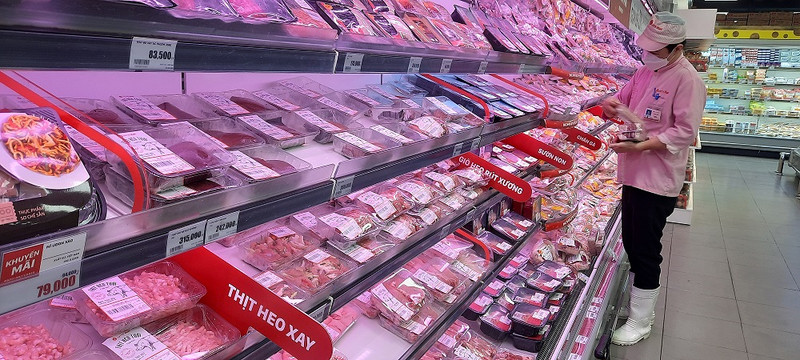Global analysts FocusEconomics has just released its fresh forecast, predicting that Vietnam’s inflation may average 3.9% in 2023, and 3.5% in 2024.
This rate is far lower than the target of 4.5% set earlier by the National Assembly.
“We expect a notable deceleration to occur in the second half of the year with declining global energy prices being the main driver. A trend of declining pork prices from peaks recorded in previous years will also help to limit food price inflation in 2023,” said analysts at the Economist Intelligence Unit, as cited by FocusEconomics.
The analysts also commented, “We forecast that consumer price inflation will accelerate to an annual average of 3.2% in 2023 but will record a declining trend in the second half of the year to about 2% by the end-2023. The softening of consumer prices will be driven by a declining trend in global oil prices next year.”
A number of international organisations have also highly valued Vietnam’s efforts to rein in inflation.
The Asian Development Bank (ADB) said that the State Bank of Vietnam has successfully maintained an accommodative but flexible monetary policy to facilitate low-cost financing to help support the economic recovery while containing inflation. Vietnam’s prudent monetary policy and effective price controls of gasoline, electricity, food, healthcare, and education should keep inflation in check at 4-4.5% in 2023.
The ADB also said that a rise in investment, controlled inflation, and accommodative monetary and fiscal conditions are predicted to drive domestic consumption, helping to boost economic recovery in this year.
According to the International Monetary Fund (IMF), Vietnam’s inflation pressure has been mostly limited to some goods like fuels and related services like transport. Consumers are largely insulated from the global surge in food prices because of ample domestic supplies, pork prices decreasing, and a preference for rice, which remains cheaper than other grains such as wheat. What is more, price gains for services, such as healthcare and education, have also been kind of mild.
Era Dabla-Norris, mission chief to Vietnam and division chief in the IMF’s Asia and Pacific Department, said that Vietnam’s inflation has stayed at a lower level than the majority of countries in the region. She suggested that the country will maintain inflation at around 4% in 2023.
Norris also underlined that Vietnam’s low interest rate and responsive monetary policies have allowed businesses to return to operation, in addition to tax cuts to assist labourers including income and environmental taxes to minimise the impacts of the global petrol price hike, and price freezes for some services, including power, healthcare and education, which have contributed to keeping inflation under control.
Inflation expanded 4.9% in January 2023, which was up from the figure of 4.55% recorded in December 2023. The Vietnamese General Statistics Office (GSO) said that January’s inflation result was the highest inflation rate since February 2020 - largely driven by a faster rise in prices of both food and catering services (6.08% against 5.21% in December) and textiles, footwear and hats (2.8% versus 2.43%), while transport prices rebounded slightly (0.05% versus -0.16%).
In the meantime, prices continued to climb for both housing and construction materials (6.94% against 7.14%) and education (11.6% as compared to 11.8%). Annual core inflation, which excludes volatile items, increased 5.21% after a 4.99% rise in December 2022. On a monthly basis, inflation ascribed 0.52% in January month on month, bouncing back from a 0.01% drop in December.
Last year, according to the GSO, Vietnam’s consumer price index expanded 3.8% year on year, lower than the level of about 4% year on year set by the National Assembly (NA) and government.
This reflects the government’s big efforts in controlling inflation amid strong fluctuations and uncertainties in the global market, the GSO said.
“There are also many reasons for optimism about Vietnam’s economic prospects in 2023. Looking forward, economic growth in 2022 was on par with pre-pandemic high growth levels, despite a challenging global economic environment, and despite a volatile stock market last year, foreign direct investment (FDI) has been strong and has even picked up. There is no doubt that Vietnam’s economic prospects for the medium and long term remain very positive,” said Andrew Jeffries, country director for the ADB in Vietnam.
“Foreign investors think long-term when they make their investments, and we noted continued strong interest in Vietnam as an FDI destination. That clearly shows a long-term vote of confidence in the country. With sound economic fundamentals and strong leadership, we strongly believe that Vietnam will be able to brace the headwinds in 2023 and beyond,” Jeffries said.
However, the ADB also underlined that risks to Vietnam’s economic outlook remain elevated. Specifically, the global economic slowdown could weigh more heavily on exports than forecast, which would worsen the current account balance. Although aggressive interest hikes by the central banks of major economies have helped dampen global price pressures, an intensification of global geopolitical uncertainties could push up commodity prices and worsen inflation in Vietnam.
Under its Resolution on the Plan for Socioeconomic Development in 2023 adopted in November 2022, the National Assembly stated that to reach the inflation target of about 4.5% this year, some solutions must be put into action.
“In 2023, it is quite necessary to keep close watch over the developments of the domestic market, and the global and regional markets, prices, and inflation in order to promptly detect risks and advance suitable measures,” the resolution read.
“There must be synchronous and flexible in monitoring, with the close combination between the fiscal and monetary policies and other macro policies so as to control inflation, contributing to macroeconomic stability and supporting economic recovery,” the resolution stated. “It is also a must to strengthen the financial and banking system’ resilience and stability in all situations with a view to closely controlling inflation, while also taking the initiative in actively applying such tools as interest rate and exchange rate in a manner appropriate for the country’s socioeconomic situation.”
Andrea Coppola: Lead economist at the World Bank
Weak global economic outlook and heightened risks may have significant implications on the Vietnamese economy in terms of exchange rate pressures, financial sector vulnerabilities, higher inflation, and slower economic growth in 2023. Authorities have a very difficult task and a very important role to play in mitigating the impact on the Vietnamese economy and transforming this challenging situation into an opportunity to modernise and further strengthen economic management and promote macro-economic stability and economic growth.
To address persistent exchange rate pressures generated by additional monetary tightening in the US, the State Bank of Vietnam (SBV) could consider allowing further flexibility in the exchange rate, including through a quicker pace of devaluation of the reference rate. Given the persistence of exchange rate pressures, direct foreign exchange sales could be used very cautiously to preserve international reserves. In case faster depreciation leads to a significant increase of inflation and inflation expectations rise, the SBV could consider using the reference interest rates again. However, policy room is limited as interest rates are already high. Close coordination between monetary and fiscal policy would help to minimise further increases of the interest rates. In medium term, authorities could modernise Vietnam monetary policy by promoting a gradual transitioning towards an inflation targeting regime.
To address liquidity challenges in the banking sector, in case some banks become more vulnerable and require support, the SBV could help to restore confidence by providing emergency liquidity assistance provided that banks have a plan in place to restore a satisfactory liquidity position, without continuous reliance on SBV lending. In the medium term, Vietnam’s bank resolution framework could be enhanced to further reinforce financial stability and a consolidated supervision framework could be strengthened to effectively monitor and assess systemic risks across markets, including banking, capital markets and higher-risk sectors such as real estate.
















